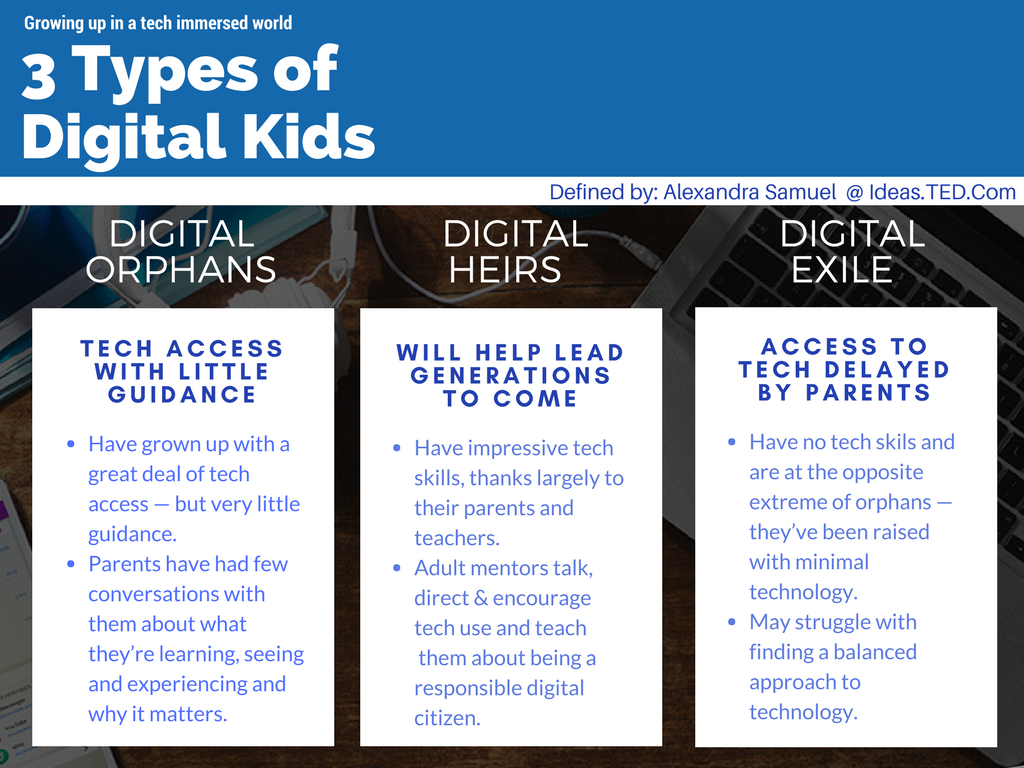- Kid's Digital Life
Who the Heck are Digital Natives?

Digital Natives
Do Digital Natives exist? If so who are they and do any of us really know what that really means? I thought I did until I came across this article written by Alexandra Samuel for TED Talks, called Forget “digital natives.” Here’s how kids are really using the Internet which made me dig a little deeper.
What is a digital native?
First, we need to define who “digital natives” are and what they do. Marc Prensky, known for inventing and popularizing the terms “digital native” and “digital immigrant”, told Mashable the following: “Digital immigrants are people who grew up in one digital culture and moved into another,” Prensky explained. “Digital natives are people who grew up in one culture. They don’t have two cultures to compare.”
At the time, the terms were used more on a metaphorical level and not as a black or white definition, but the idea of digital natives and digital immigrants has been evolving since the terms were first coined back in 2001. It’s now 2017 where smartphones share the space with smart homes, smart trashes and even smart hairbrushes!
Which is your kid? Digital Heir, Orphan or Exile
I’m bringing this up because as an adult who until the other day had not really put much thought into it, realize that I’m somewhere in between. In some ways, I am a digital immigrant but at the same time, I also see technology as something that has always been in my life. So, does this also make me a digital native? Or something else altogether?
I guess that’s for me to figure out and more importantly get to the point of the story, which is how important it is to understand your own relationship with technology and the one you allow your kids to have. Understanding whether or not you’re keeping your kids down for whatever your personal reasons are and how you can make their digital lives more enlightening as they grow and tech keeps evolving.
Going back to Alexandra’s article, she went a step further and categorized the digital native audience into three parts. She calls them Digital Orphans, Exiles, and Heirs. Heirs have the best tech skills from coding, to a superb understanding of being a responsible digital citizen online and on social platforms. They may even have had blogs, social media accounts and more at a very young age thanks to the encouragement of parents and teachers.
Orphans, well she more or less explains that they’ve had the freedom of playing with tech, having smartphones perhaps at a young age but without deep guidance, and exiles are those poor kids who’s parents basically want to keep in a plastic bubble until their teenage years which is pretty much the age when kids rebel. Alexandra warns that it is these kids who then throw themselves into their digital life with a vengeance!

Our approach as parents
Alexandra’s explanation makes a lot of sense and is a great eye-opener for those still struggling with the acceptance that technology whether in your home or in your child’s hand is a good thing, not a bad thing.
No one is saying you should start opening up social media accounts for your underaged kids immediately or ship them off to code camp every summer, but society is demonstrating that we have to take into account that tech is all around us. It is an important part of our kids’ daily lives. You can’t slow down your child’s education simply because you’re too lazy to get involved or too scared it’s going to ruin or harm them.
The gist
Understanding what category you’re in and the ones your kids fall into is very important in how you’ll help shape their future. Your kids might be digital natives today, but 15 years from now the new immigrants and so on. Digital competence will continue evolving from one generation to the next.
All kids are different, not all kids like the same things, clearly everyone has their own style and personality and their relationship to technology will differ from one child to the next. This is where we as parents come in to ensure that however they decide to use technology in their lives, we encourage and endorse a positive experience.
Most popular post in this categorie

How to Keep Parental Controls From Ruining Your Kids Life

Popular Social Media Apps and How Teens & Tweens Are Using Them
